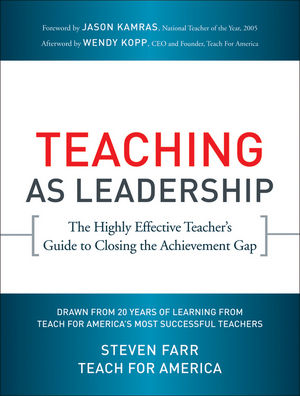Teaching As Leadership: The Highly Effective Teacher's Guide to Closing the Achievement GapISBN: 978-0-470-43286-0
Paperback
352 pages
February 2010, Jossey-Bass
 This is a Print-on-Demand title. It will be printed specifically to fill your order. Please allow an additional 10-15 days delivery time. The book is not returnable.
|
||||||
Foreword by Jason Kamras xi
Introduction 1
Chapter 1: Set Big Goals 15
Foundations of Effective Goal Setting 18
Inspiring Strong Results with Measurable Outcomes 19
Inspiring High Performance with High Expectations 26
Leading with Students’ Needs and Interests 36
The Qualities of Effective Big Goals in Action 37
What Measurable Academic Progress Should My Students Achieve?
41
What Traits and Mindsets Will Best Serve My Students? 44
What Pathways to Student Opportunity Should Inform My Big Goal?
45
What Student Interests and Motivations Could Shape the Big Goal?
46
Conclusion: Key Ideas and Next Questions 48
Key Ideas 48
Next Questions 49
“Why Do People Set Big Goals?” from Ms Lora’s
Story 50
Chapter 2: Invest Students and Their Families 53
Key Elements of Investment 57
Shaping Students’ Mindsets 57
Collaborating with Students’ Families and Influencers
62
Strategies for Investing Students 72
Creating a Welcoming Environment to Increase Student Investment
72
Developing a Culture of Achievement 84
Investing Students Through Instruction and Learning 98
Conclusion: Key Ideas and Next Questions 102
Key Ideas 102
Next Questions 103
“What If You’re Wrong?” from Ms Lora’s
Story 105
Chapter 3: Plan Purposefully 107
Foundations of Purposeful Planning 110
Developing Your Vision of Success 111
Translating Your Vision into a Well-Designed Assessment 112
Mapping Out a Vision-Aligned Plan by Imagining Yourself
Implementing It 115
Three Forms of Classroom Plans 119
Long Term Plans 119
Lesson Plans 123
Classroom Management Plans 135
Conclusion: Key Ideas and Next Questions 137
Key Ideas 138
Next Questions 139
“It Still Tastes Good” from Ms Lora’s Story
140
Chapter 4: Execute Effectively 143
Key Elements of Effective Execution 146
Doing Well What Must Be Done 146
Insisting on Seeing Reality 148
Adjusting Course as Circumstances Change 150
What Effective Execution Looks Like in the Classroom 152
Effectively Communicating Key Ideas 152
Coordinating Student Practice 153
Checking for Understanding 154
Tracking Progress 158
Maximizing Efficiency with Organization and Routine 161
Asserting Authority 163
Conclusion: Key Ideas and Next Questions 167
Key Ideas 168
Next Questions 169
“Light Monitor Form Collector Plant Manager” from Ms
Lora’s Story 170
Chapter 5: Continuously Increase Effectiveness 173
Foundations of Continuous Improvement 175
Effective Teaching Is a Learnable Skill 175
“Data may not tell us the whole truth, but it certainly
doesn’t lie” 177
We Drive Our Own Improvement 178
No Teacher Is an Island 179
A Cycle of Reflection That Leads to Increased Effectiveness
182
Phase One: Analyzing Outcomes 183
Phase Two: Discerning Causes 185
Phase Three: Identifying and Implementing Solutions 191
Conclusion: Key Ideas and Next Questions 192
Key Ideas 192
Next Questions 193
“This Was My Summer School Seat” from Ms Lora’s
Story 194
Chapter 6: Work Relentlessly 197
We Control Our Students’ Success and Failure 198
Key Elements of Working Relentlessly 200
Persistence 200
Maintaining High Expectations 202
Expanding Time and Resources 206
Expanding Your Influence 209
Sustaining This Work Over Time 217
Conclusion: Key Ideas and Next Questions 223
Key Ideas 223
Next Questions 225
“You Are Going to Be Totally Handsome in Them” from Ms
Lora’s Story 226
Conclusion 227
Afterword: Teaching As Leadership and the Movement for Educational
Equity by Wendy Kopp 231
Appendix A: Teaching As Leadership Rubric 237
Appendix B: About Teach For America 269
Appendix C: Our Approach to Teacher Development 273
Appendix D: How We Learn from Our Teachers 285
Teacher Biographies 291
Notes 317
About the Author 328
Acknowledgments 329
Index 331



